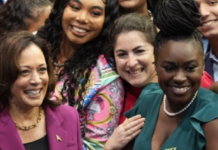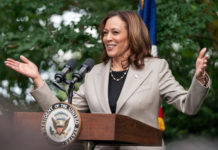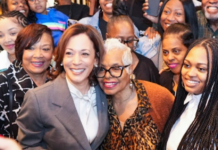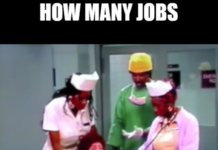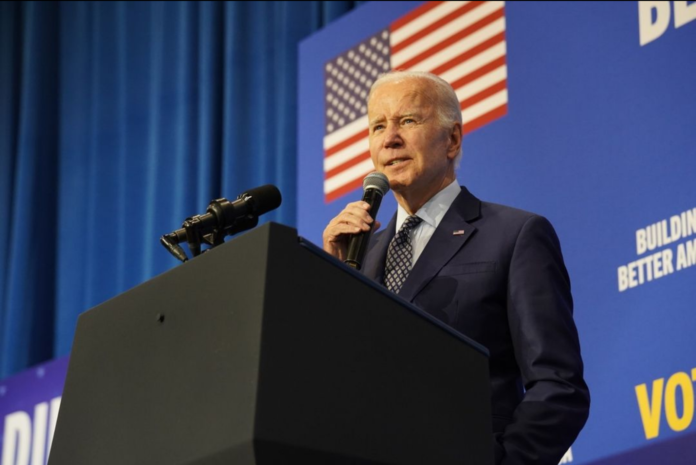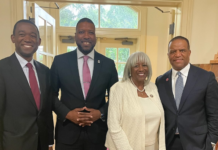President Joe Biden took questions from the White House press corps the day after the midterm elections, calling it “a good day for democracy” in which the “American people have spoken.”
However, as votes continue to be counted and signs point to the possibility of Democrats losing their majority in the U.S. House of Representatives (albeit not as bad as predicted), the president also acknowledged that “voters are still frustrated with a really tough few years.”
Biden called on nine reporters at the Wednesday press conference inside the State Dining Room. TheGrio posed three questions to the president on the Supreme Court’s looming decision on affirmative action, the impact of inflation on Black households, and how he plans to legislate in a politically divisive nation where empathy is lacking.
On the affirmative action cases currently before the United States Supreme Court, if overturned, some legal experts have expressed worry that it would have tentacles that reach beyond college admissions and could also impact the landmark 1954 decision, Brown v. Board of Education, which ended racial segregation in public schools.
In response to what he would do in the event of the overturning of affirmative action, a decades-old policy that considers race as one of many factors in college admissions, President Biden said he asked the Department of Justice to defend the present policy before the Supreme Court. He added, “like a lot of pundits, I’m not prepared to believe that the Supreme Court is going to overrule the previous existing decision.”
The conservative majority on the high court seems poised to strike down affirmative action as a policy in higher education. During oral arguments of one of the pair of cases, Students for Fair Admissions v. Harvard, Justice Amy Coney Barrett questioned if affirmative action had run its course.
“Although the Brown v. Board case was about schools, the rationale of the case was used to support laws and policies that undermined segregation in other areas, public accommodations, transportation, etc,” noted Kurt Schmoke, president of the University of Baltimore, in an interview with theGrio.
“If the Supreme Court says that race can’t be considered in college admissions, it will be argued that race can’t be considered in other areas; for example … set aside programs [for minority businesses] or grant programs targeting Black farmers.”
TheGrio also asked President Biden about his plans to combat inflation and its impact in Black communities in the next two years of his term, citing a survey of Black voters conducted by theGrio in partnership with KFF that shows economic issues were their top concern ahead of the elections.
“I can’t guarantee that we’re going to be able to get rid of inflation. But I do think we can,” said the president, who noted that his administration brought down the price of gasoline by about $1.20. He also blamed oil companies, something his administration has done often, for “doing the nation a real disservice.”
Referring to legislation he’s already passed into law, like the Inflation Reduction Act, the president added, “One of the things that makes a gigantic difference is what are the costs that exist in the average family in … [the] Black community? One, prescription drug cost, well, we’re driving those down precipitously beginning next year.”
Biden also highlighted economic successes for Black households and businesses, highlighting that the Black unemployment rate has “almost cut in half” under his administration since the start of his term. The president added that Black-owned small businesses have opened up more “than ever before.”
“We’re now in a situation where we’re providing, through the Small Business Administration, down payments for people buying homes because most people accumulate wealth in the value of their home,” he continued.
TheGrio’s final question to President Biden focused on how he plans to center empathy in a political climate driven by extreme and hateful rhetoric. The exchange was shared on the president’s official social media accounts.
“Part of what I think leadership requires, and I hope I meet the standard, is letting people know you understand their problem,” Biden said. Quoting his late father, he said, “I don’t expect the government to solve my problem, but I expect them to at least understand what they are.”
The president added, “What we can do to deal with that empathy is make sure there’s help available. Make sure there’s people who are there to help, whether they are a psychologist or whether they’re medical doctors or whether they’re social workers to be there to help.”
Biden also offered a policy prescription, reinstating the child tax credit, as a legislative way to employ empathy for families impacted by poverty. Acknowledging that he and Democrats were unable to pass an extension of the popular tax credit, the president noted, “it cut child poverty by 40% when it was in place.”
“There’s a lot we can do. And the empathy is not just talking about it; it is communicating to people you genuinely understand.”
Ironically, this reporter attended the last post-midterm elections White House press conference with then-president Donald Trump. Trump infamously told this White House correspondent to sit down when asking about voter suppression in the 2020 elections. Four years later, this reporter stood before President Biden, who took multiple questions from her for more than 11 minutes.
Story Credit: April Ryan/thegrio
Image: Instagram


